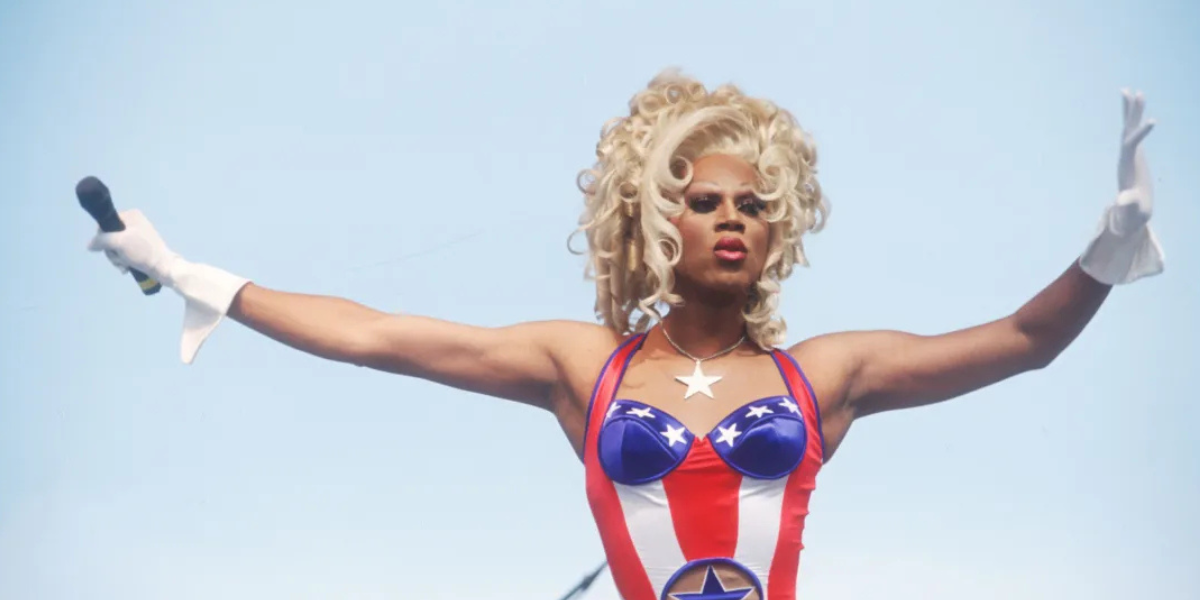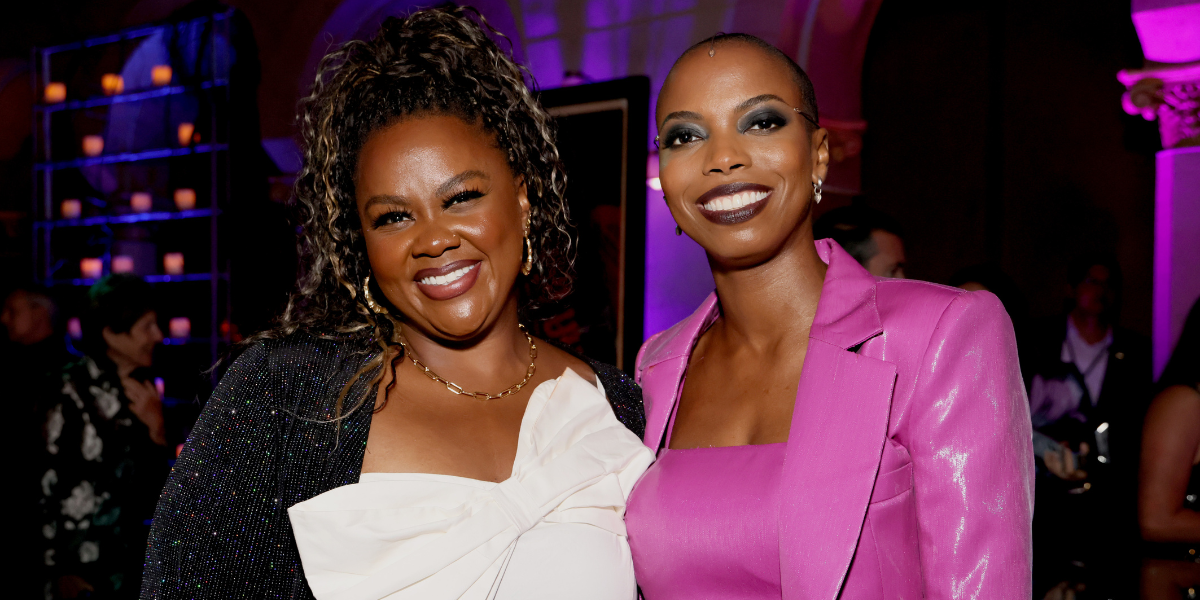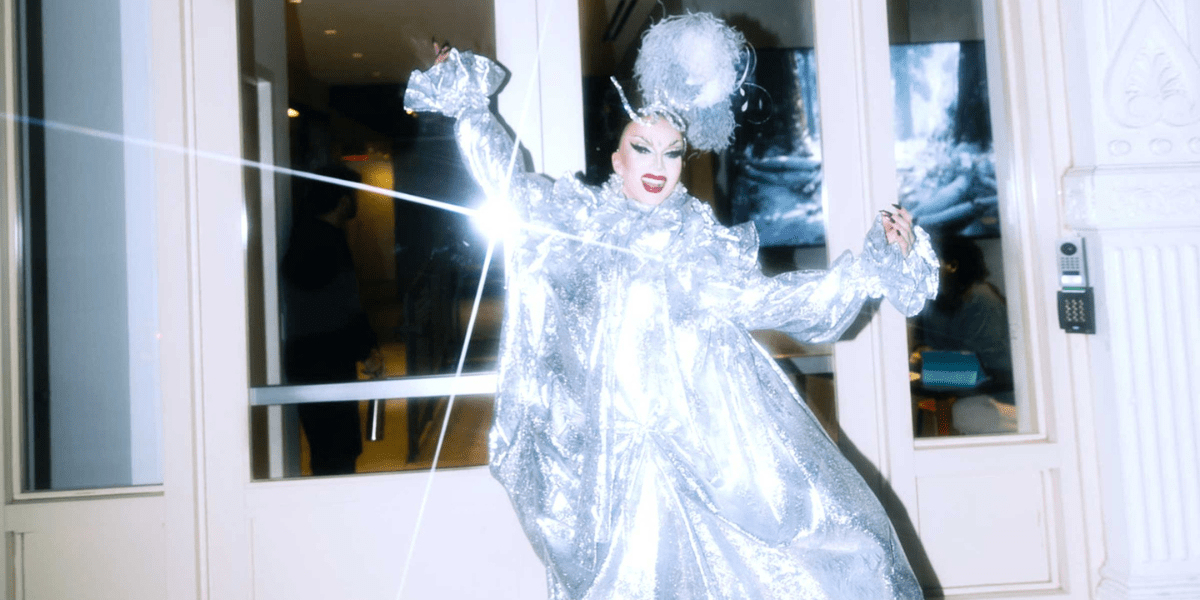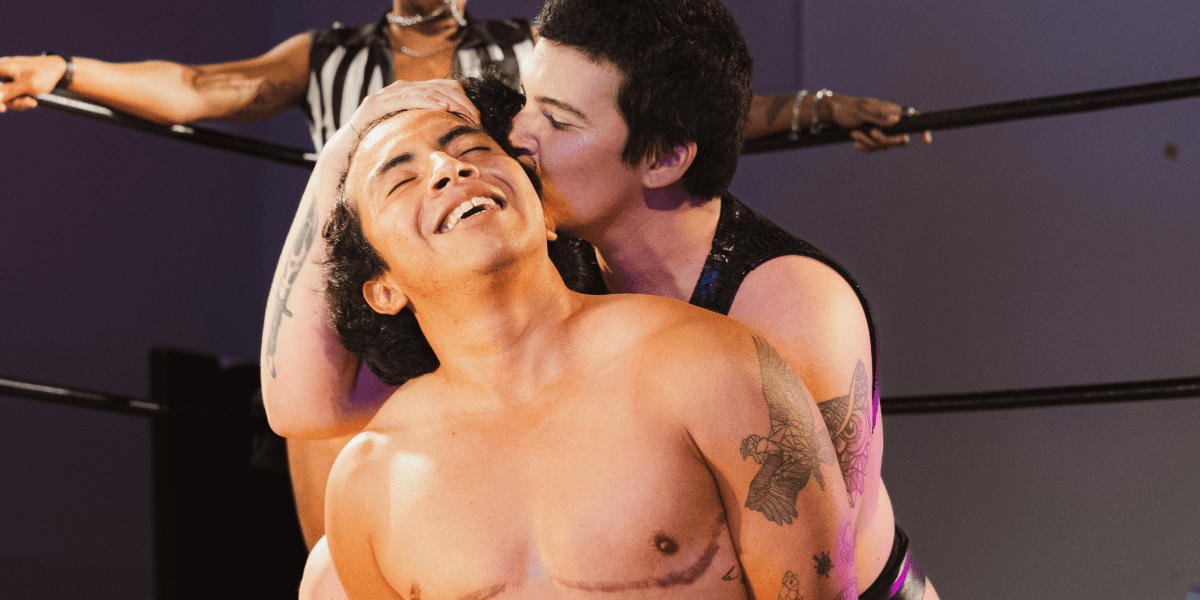feature image photo of @/whatsuplavren
The queer community is no stranger to constructing our own vernacular. Historically, we’ve had to refer to one another by innocuous labels like “friend of Dorothy” to identify one another, or utilize the hanky code or various other stages of dress to clarify both who we are and what we are into.
In lesbian community, these terms have not just been for identifying one another in the wild, but for participating in a queer subculture of identity and relationships. Butch and femme are the most significant of such terms, coming to prominence in working-class communities and communities of color in the 1940s and 50s. Over time, other terms that fall under either (or neither) of these umbrellas have come to be used with each passing generation: soft butch, stone butch, futch, stud, stem, high femme, chapstick lesbian, lipstick lesbian, et cetera ad infinitum. Most recently, with the advent of TikTok, terms have expanded even further.
For those within Gen Z and/or on TikTok, familiarity with the “hey mamas” lesbian is likely. As defined by Them: “‘Hey mamas’ lesbians can be distinguished by their fashion (think snapback, sports jersey, and long hair in a bun to show off their undercut) and exaggerated masc swagger, i.e. posting thirst traps on social media of them biting their bottoms lips and saying ‘hey mamas’ to a theoretical femme on the other side of the camera.” While the “hey mamas” term originated around 2020, a newer label for a subgenre of masculine lesbian has developed over the past year or so, known as the “girlypop masc.”
A girlypop masc, as TikTok seems to define it, is a masculine-presenting lesbian or butch who, despite dressing masculinely, is in fact very feminine in behavior — “girlypop” being a slang term to refer to someone who is openly queer, or to a female or effeminate person. Popularized by the TikToker @whatsuplavren, videos portraying a girlypop masc often feature a lesbian in masculine dress — think cargo shorts, muscle tees, oversized collared shirts — doing something stereotypically feminine, such as dancing provocatively, being the little spoon, or gesturing limply with their wrist.
The term has gained momentum and popularity among masculine-presenting lesbians who feel seen by the term’s allowance for masculinity and femininity to coexist in their identity. Also categorized as a “twink masc” or a “sassy masc,” the terminology exists for those lesbians who enjoy masculine dress but who also wish to have their femininity (and for some, their identity as women) validated. I can only speak from personal experience, but as someone who categorizes herself as a masc lesbian and who is friends with other masc lesbians and butches, I have heard this point of view authenticated. However, I have also heard criticism of the term, warning that it can be infantilizing and invalidating to lesbians who pride themselves on their butchness and masculinity.
So, what is the origin of the girlypop masc, and what are the arguments for and against it?
Where Did ‘Girlypop Masc’ Come From? Plus, a Little History Lesson
While browsing a digital archive can complicate locating the exact origin of something, it appears the term was popularized by the TikTok creator @whatsuplavren. The majority of Lavren’s content concerns itself with representing masculine lesbians with a “feminine side.” Much of their content features them dancing to songs by artists like Chappell Roan or Billie Eilish, or videos with captions such as “when you think you’re getting a masc but you’re really getting a fem,” that portray the creator in boyish clothes seeking affection and “babying” from their femme partner.
The comment sections on these videos are varied, to say the least. Some comments are overjoyed at the term, proclaiming that they too identify with it, or that such lesbians who would categorize themselves this way are their ideal type. Other popular lesbian/queer TikTok creators have utilized this term for engagement as well, including but not limited to @emgracedawg, @__callmejo___, and @sandykeayes.
Whereas the “hey mamas” trope proliferated during quarantine TikTok, it never quite existed as a term used to self-describe so much as a term to critique a certain type of masc-presenting lesbian (as Them puts it, “white and other non-Black lesbians who adopt the aesthetics and language of Black and brown masc lesbians, often taking on a persona that feels inorganic and inauthentic at best, and appropriative at worst”). Girlypop masc in fact seems a welcome association for many online lesbians, who proudly utilize the term in their content and identification.
As I said, creating a sexual and gendered vocabulary tied to lesbian and queer identification is no new pastime. As J. Halberstam writes in Female Masculinity, “[I]t has been the butch-femme couple that has signified and made visible and articulate an active and complex desire between women” (115). The chapter in the book from which I draw this quote, “Even Stone Butches Get the Blues,” is an essential read (in my opinion) on learning about the history and implementation of butch/femme codes. The origin of such gender relations that came about in the 1940s and 50s, and was rejected widely by lesbian feminists in the 1970s, has undergone another transformation with the advent of the 2010s and 20s’ widening acceptance of queerness as well as social media access.
I’m no gender theorist; I’m just a lesbian with a TikTok account. But from being on TikTok, I have seen a massive favorability towards labeling in this way — though, the word “butch” seems much more lacking in association than the term “masc.” Of course, everyone’s personal choices for self-identification are their own business, but it does raise a question as to why it seems butch is out, and masc is in. More on that later. For now, let’s examine those in favor of the “girlypop masc.”
The Pro-Girlypop Masc Side
I’m not the Pew Research Center, so my polling is limited to those I know in person or who follow me on social media. So this article can’t display a full-faced calculation of just how the lesbian community at large thinks of this term. However, in the conversations I’ve conducted, or seen conducted in videos or those videos’ comment sections, I have seen much love for the term.
For those in favor, the consensus seems to sway towards an excitement for existing outside an expected binary gender assignment. My friend Ana, who self-describes most adequately with the term “dyke,” explains that, for her, it’s a result of struggling to find one’s queer identity in a sea of heterosexual expectations. For straight people, predictably, lesbianism is reduced to stereotypes: the hypermasculine, man-hating butch, for instance. Hatred of masculine women and woman-adjacent people runs deep in heteropatriarchal cultures. It’s viewed as unnatural and unbecoming — however, it is also a quick and easy way for people within the community to identify one another in the wild.
Ana makes a salient point that I don’t disagree with: For her, growing up, presenting masculinely was the one surefire way to be identified as a lesbian. Not having to come out (for the most part) in public, because she knows she will always be seen as gay due to her preferred uniform of oversized hoodies, boys’ shorts, and Carharrt hats — this was an important fashion design for her. Again, in line with Halberstam’s thoughts, who says that while it may seem “unfruitful” to see lesbianism as inherently masculine, it’s necessary “to acknowledge that historically within what we have called lesbianism, masculinity has played an important role” (119).
However, as Ana grew up and into her lesbianism, recognition of her femininity came fast and with unexpected power. For her, being recognized as a woman is crucial to her presentation as a masculine lesbian. Despite masculine clothes, that doesn’t detract from her pride to be a woman, to be a lesbian woman specifically. For her, the term “girlypop masc” allows her to bridge the gap of gender in her presentation.
Many other lesbians I spoke with think the same. Some said they have felt expectation from past partners to “act like a man” because they are masculine or butch — when in reality, they feel much like “princesses,” and value being seen as masculine women rather than men and that there is a clear difference between the two that they want validated. Their excitement at the term comes from being seen specifically, still, as women.
Others I’ve talked to say they enjoy the term’s ability to transcend gender identity as well as gender expression — that the term can be used for “tboys” who still “want to be in female community and solidarity.” A few non-binary lesbians I’ve spoken with say they enjoy the term’s fluidity, how it allows them to swim between their own sense of masculinity and femininity, in a manner that doesn’t require explicit choice between the two.
For me, at first, I found similar enjoyment from the term. I can only truly speak on my own experience with gender expression and identity, and what I would say is that, I have been associated with the term girlypop masc since before it was even a concrete term. Once a friend of mine looked at me incredulously, then said, “You know, you’re masc but you’re masc in the way a flamboyant gay man is masc. You’re kind of like a twink.”
I’ve since found humor and pride in categorizing as such.My closest friend, who identifies as bakla (a Filipino gender defined most often as a “non-conforming male, effeminate gay man, or third gender”), and I have routinely been corralled together as the Twinks. Our activities have included dancing to Charli XCX at nightclubs, sniffing poppers, and having weekly Drag Race nights togethers; such things not just associated with femininity, but with a particular gay, male femininity.
So for me, I at first found girlypop masc an amusing, observant categorization. However, I never felt fully comfortable with the way I was seeing it used on social media and couldn’t put my finger on why. As I investigated further, I found the other side of the argument.
The Anti-Girlypop Masc Side
TikTok fashion influencer @claire_holt12 came under fire last year for claiming “no one likes to say butch” — in response, many butches and other lesbians jumped to the word’s defense. In particular came TikToker @gabbyisbutch, who says in a stitched video response to Claire’s: “It’s because of old butches and old studs of history that ‘masc lesbians’ get to be masc lesbians.” They then go on to say Claire (and others who may think like her) should thank older butches for paving the way for “masc lesbians” to identify as such, and finishes the video with a salient point: “Because saying ‘I’m not butch, I’m masc,’ sounds a lot like saying ‘I’m not a lesbian, I’m gay.’”
Much of the critique of the term’s popularity comes from a concern that has deep, impacted roots in lesbian culture and history. In inquiring about why some folks may be against “girlypop masc”, many of the butches I’ve spoken to personally or seen conversing online echo similar sentiments: a worry that the term, despite its apparent lightheartedness, is in fact a mask for internalized homophobia and externalized anti-butch ideals.
While the word “discourse” when applied to online circles certainly instills a cold chill of fear into my spine, much discourse does abound about the possible unexpected effects of using terms like these. The main issue taken seems to be that, rather than liberating, the term is “fetishizing” or “objectifying” — turning lesbians who may fall into this category as, well, just that. A category, rather than a person. There is also concern that the term falls into similar anti-butch and anti-lesbian ideas that heteropatriarchal structures often force on us all. That the “masculine woman” is only acceptable if she can prove womanhood by engaging in traits and activities that are considered feminine. I have seen comments in girlypop masc video comment sections even decrying that this is the ideal masc lesbian, and that they don’t want to date someone who “acts like a man.”
Obviously, this is a problematic take, and in many ways feels like the lesbian version of “not like other girls” — “I may be a lesbian, but don’t worry, I’m not one of those lesbians” or “I would never date one of those lesbians.” Hatred of butches and masculine/GNC lesbians is not new, nor is it exclusive to heterosexual cisgender outsiders. Like Halberstam expresses, “Many lesbians have seen and still do see the butch dyke as an embarrassment…” (120). Though their book was originally published in 1998 (and republished in 2018 for its 20th anniversary), this point rings true even now. While mainstream television series and movies are warming up to lesbian representation, much of that representation is still for more feminine-presenting individuals, and femme/femme couples. Even prominent lesbian media (looking at you, L Word) is reticent to feature butches.
Many of the butches I’ve spoken to reject the word, too, as unnecessary. There is and always has been room for femininity within butchness, or variations of it. In the butch bible, Stone Butch Blues, Leslie Feinberg even says, “After a while you see how many different ways there are for butches to be.” Many believe the idea that a new term must be created separate from butch to incorporate feminine ideals is disregarding butch’s history within lesbian and queer circles and reducing both butch and femme to mere aesthetics, when historically and culturally they have been so much more than that.
To reiterate, I can again speak only truly of my own opinions and experience, but these points hit the nail on the head for me in regards to why I could never fully get behind the term. While the term itself is not inherently anti-butch, or intentionally so, I have seen negative reception against butches from those who would celebrate the term. While for me, and plenty of other masculine-presenting lesbians and butches, being able to be feminine is part of our gender presentation, for many others it is not. And they are among some of the most maligned in our community: by outsiders and insiders alike. I have seen several butches on TikTok highly reject the term, stating their masculinity is a deliberate choice, and they want it celebrated — not that they have hatred for femininity, but in a world that replies to masculine women and AFAB folks with brutal violence, they have fought for this presentation.
Another Halberstam: “[W]hy should we necessarily expect butches suddenly to access some perfect and pleasurable femaleness when everywhere else in their social existence they are denied access to an unproblematic feminine subjectivity?”
A Girlypop Masc Conclusion…?
At the end of the day, labels and terms are created for us to categorize ourselves in ways we feel most comfortable. If being a girlypop masc feels liberating, that’s fantastic! And if it feels like a cage, that’s okay, too. The important root to keep coming back to is understanding how people self-identity — not identifying them without their input, and on another note, not “ranking” those identities by what we want to see and what we don’t.
Butches and other masculine lesbians have paved the way for all lesbians to express their joy, their lives, their appearance. We cannot turn against them — I am a fierce protector of butches, and allowing butches to just be is something the contemporary lesbian community (and arguably the historical lesbian community) can sometimes struggle to do.
Unfortunately, labels created by humans will never retain the same fluidity or nuance as humans themselves. Rather than try to stamp a definitive Right or Wrong category onto a word, examination on a word’s meaning to the self seems crucial. If you are a proponent of the term girlypop masc, examine why the term feels good. None of us are free from prejudiced or complicated views — after all, no matter our personal experiences, we were all raised in a society overwhelmingly unwelcoming to queer people, especially those of us who seem to go against expectations of apple pie American womanhood.
We don’t exist in a vacuum, so our terms inherently can’t either. The reason so many terms exist in our community is because we, as lesbians of all genders and presentations, exist outside the traditional norm. We are all enemies of a heteropatriarchal structure, no matter how feminine we may be in dress or act. To turn against one another is not what needs to happen. While we should all be free to use the terms that feel most true to ourselves, it is also important to understand the history of the words we do use, and to keep those histories in mind when we consider labeling others, especially those we do not know.
My conclusion on the term girlypop masc? I don’t know. The one belief I walk away from this article with is that it is crucial for us to educate ourselves on the history of our communities, if we ever want to believe we can truly be a community.








Comments
Phew, this article was exhausting for me and made me so happy I’m largely off social media. Anything that’s helping people find identity and fulfillment without hurting others is worthwhile. On the other hand, I personally found the odyssey of flipping through ever more rarefied, intellectualized, and specific internet subcultures to try to figure out who I was stultifying. Masc, butch, femme, girlypop, all are a way to try to redefine a ‘right’ way of being a person when the most beautiful, expansive definition of queerness is freeing yourself from those expectations. Except for practical dating concerns like figuring out what reads as queer in your town, I’m much happier knowing any way I want to present myself that’s comfortable or fulfilling is the right way for me to be a queer woman. Even if I’m throwing others and myself by getting a butch haircut and suddenly discovering I love wearing sundresses in the summer
Your blog has become an indispensable resource for me. I’m always excited to see what new insights you have to offer. Thank you for consistently delivering top-notch content!
This is why new slang and labels are so scary to me, they each probably have at least one master’s thesis of history and unpacking involved…
Hell, before I realized I was trans, I was anxiously posting on social media asking if it was appropriation for “just a slightly gnc guy” to get and wear the stereotypical striped thigh high “programmer socks” associated with trans women…. 🤣
(that said this is a really nice exploration of the term. I hadn’t heard it before but I am not on tiktok. It’s really nice and academic, which is a compliment from me.)
great one
I GET OT DUDE. I joke I have a stereotypical gay man like a butch twink now that I think about it way of partying. I’m still a top but I like the idea of doing drugs and going to a rave because threats my music scene not Tegan Sara (not poppers because that’s faggy with opening the ass cheek)
I love the evolution of language in our community, especially online. I’m not on TikTok so I’d not heard about this before – great article!
This makes a lot of sense to me. I’m gen z, and I feel like “butch,” while a useful category, doesn’t fit a lot of masc queer women. Personally, I don’t feel like I’m butch enough to claim that label: I paint my nails, I have a feminine face, body, and voice, and I socialize primarily with women (both straight and queer). Calling myself butch would feel like stolen valor, but I’m distinctly masc. “Girlypop masc” is the best term I’ve heard that captures this duality.
THIS IS EXACTLY IT! I’m a Gen Z masc and I feel the same way: not butch enough for butch, but still more masc than average queer women. “Girlypop masc” is the most fitting term I’ve heard for this. I don’t want to call myself butch when that’s not how I feel and not how the rest of the community would identify me, and girlypop masc (or even just masc) bridges that gap.
Buy cocaine online, Cocaine for sale, Cocaine vendor
where to buy Cocaine Online, Order Cocaine online
https://cocaineforsale.co/
Telegram : @kokamana
Cocaine%80for%5sale%15?s=https://cocaineforsale.co/
buy%50Cocaine%50?s=https://cocaineforsale.co/
moderators please remove this comment.
Industrial Chemicals
great comment
What is the’metal is girlypop’ trend on TikTok?
moderators please remove this comment. (contains hidden link for SEO)